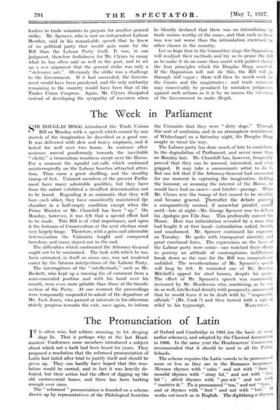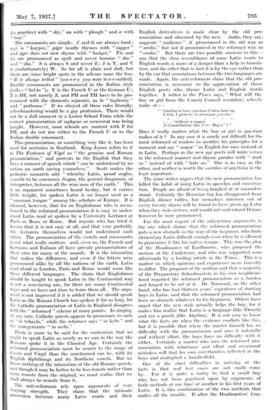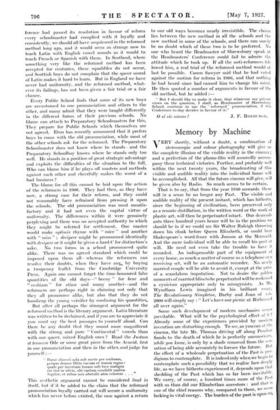The Pronunciation of Latin
IT is often wise, but seldom amusing, to let sleeping dogs lie. That is perhaps why at the last Head- masters' Conference some members introduced a subject about which not a bark had been heard for years. They proposed a resolution that the reformed pronunciation of Latin had failed after trial to justify itself and should be given up. They can hardly have hoped that this reso- lution would be carried, and in fact it was heavily de- feated; but their action had the effect of digging up the old controversial bones, and there has been barking enough ever since.
The " reformed " pronunciation is founded on a scheme drawn up by representatives of the Philological Societies of Oxford and Cambridge in 1905 (on the basis of some earlier schemes), and adopted by the Classical Association in 1906. In the same year 'the Headmasters' Conference recommended that it should be used in all the Puh1ic Schools.
The scheme requires the Latin vowels to be pronounced more or less as they are in the Romance language Mensam rhymes with " calm " and not with " ham • motzebit rhymes with " stray bit," and not with " fro. bit " ; abivit rhymes with " pee-wit " and not with " contrive it." Tu is pronounced " too," and not " tyoo, and ut rhymes with " foot " and not with " but." () works out much as in English. The diphthong te rhymes (in practice) with " sky," au with " plough " and w with boy.'
The consonants arc simple. C and G arc always hard ; cepi is " kaypee," piger nearly rhymes with " nigger " and ager does not now rhyme with " badger." Tio and tia are pronounced as spelt and never become " sho " and " sha." S is always S and never Z ; J is Y, and V is (unfortunately) W. So far all is plain and dull, but there are some bright spots in the scheme none the less. " R is always trilled " (sor-r-r-y you were tr-r-r-oubled). Double consonants are pronounced in the Italian style (hello bel-lo "); Y is the French U or the German U; Z is DZ, not merely Z, and PH and TH have to be pro- nounced with the elements separate, as in " taphouse " and " pothouse." If we obeyed all these rules literally, schoohnastering would be a gay profession. There would not be a dull moment in a Lower School Form while the correct pronunciation of zephyrus or occurrerat was being taught. However, most schools are content with P for PH, and do not rise either to the French U or to the Italian double consonant.
This pronunciation, or something very like it, has been used for centuries in Scotland. King James refers to it in The Fortunes of Nigel as " the genuine and Roman pronunciation," and protests to the English that they have a manner of speech which " can be understood by no nation on earth saving yourselves." Scott makes the pedantic monarch add " whereby Latin, quoad anglos, ceaseth to be cominunis lingua, the general dragoman, or interpreter, between all the wise men of the earth." This is an argument sometimes heard to-day, but it carries little weight, for spoken Latin is no longer used as a " common tongue " among the scholars of Europe. It is claimed, however, that for an Englishman who is accus- tomed to the reformed pronunciation it is easy to under- stand Latin read or spoken by a University Lecturer at Paris or Bonn or Rome. But anyone who has tried it knows that it is not easy at all, and that very probably the lecturers themselves would not understand each other. The pronunciation of the vowels and consonants is not what really matters--and, even so, the French and Germans and Italians all have private pronunciations of their own for many. of the sounds. It is the intonation that makes the difference, and even if the letters were pronounced alike by all the nations of the earth, Latin read aloud in London, Paris and Rome would seem like three different languages. The claim that Englishmen should be taught to speak Latin in the Continental way is not a convincing one, for there are many Continental Ways and we have not time to learn them all. The argu- ment is not improved if it is added that we should speak Latin as the Roman Church has spoken it for so long, for the Catholic pronunciation of Latin in England disagrees With the " reformed " scheme at many points. In singing, at any rate, Catholic priests appear to pronounce in caelo as "in tehaylo," while the reformer says " in kylo " and the unregenerate " in seelo."
There is more to be said for the contention that we ought to speak Latin as nearly as we can in the way the Romans spoke it .in the Classical Age. Certainly the reformed pronunciation must be nearer to the usage of Cicero and Virgil than the unreformed can be, with its English diphthongs and its Northern vowels. But we know nothing of the intonation of the old Roman speech, and though it may be better to be less remote rather than more remote from the original, we must realize that we shall always be remote from it.
The anti-reformers rely upon arguments of very varying . strength. They claim that the intimate connexion between many Latin words and their English derivatives is made clear by the old pro- nunciation and obscured by the new. Audio, they say, suggests " audience " if pronounced in the old way as " awdio," but not if pronounced in the reformed way as " owdio." But there are two possible answers to this— one that the close resemblance of some Latin words to English words is more of a danger than a help in transla- tion, and the other that in fact it is by the eye rather than by the ear that associations between the two languages are made. Again, the anti-reformers claim that the old pro- nunciation is necessary to the appreciation of those English poets who rhyme Latin and English words together. A writer in the Times says, " What will the boy or girl from the County Council secondary schools make of :- '' Careful of love, careless if thou hate us, I rest, I protest, in utrunigue p . . . without a wager.
A Constellation, like 1.7r81 Major' ?"
Does it really matter what the boy or girl in question makes of it ? In any case it is surely not difficult for the most reformed of .readers to sacrifice his principles for a moment and say " major " in English for once instead of in Latin. Perhaps in the new age poets will write verses in the reformed manner and rhyme paratus with " start us " instead of with " hate us." One is as easy as the other, and neither is worth the sacrifice of anything in the least important.
The same writer argues that the new pronunciation has killed the habit of using Latin in speeches and conversa- tion. People are afraid of being laughed at or misunder- stood. Certainly the Horatian tag has disappeared from English dinner tables, but nowadays nineteen out of every twenty diners will be found to have given up Latin when they were sixteen, and would not understand Horace however he were pronounced.
Far the most cogent of the anti-reform arguments is the one which claims that the reformed pronunciation puts a new obstacle in the way of the beginner, who finds elementary Latin difficult enough even when he is allowed to pronounce it like his native tongue. This was the plea of the Headmaster of Eastbourne, who proposed the motion at the Conference, and who was supported soon afterwards by a leading article in the Times. This is a matter on which opinions and experience seem honestly to differ. The proposer of the motion said that a majority of the Preparatory Schoolmasters in his own neighbour- hood regarded the reformed pronunciation as a burden and longed to be rid of it. Dr. Norwood, on the other hand, who has had thirteen years' experience of starting boys in Latin, said that the reformed pronunciation had been no obstacle whatever to his beginners. Others have urged that the new style actually helps the boy, for it makes him realize that Latin is a language (like French) and not a puzzle (like Algebra). It is not easy to know what the facts are when the evidence conflicts like this, but it is possible that where the master himself has no difficulty with the pronunciation and uses it naturally and without effort, the boys have no difficulty with it either. Certainly a master who uses the reformed pro- nunciation with reluctance and effort and occasional mistakes will find his own uncertainties reflected in the boys and multiplied a hundredfold.
One of the chief difficulties in arriving at the facts is that real test cases arc not easily come by. For it is quite a rarity to find a small boy who has not been practised upon by exponents of both methods at one time or another in his first years of Latin. It is this combination of the two methods that makes all the trouble. If after the Headmasters' Con- ference had passed its resolution in favour of reform every schoolmaster had complied with it loyally and consistently, we should all have acquiesced in the reformed method long ago, and it would seem as strange now to teach Latin with English vowel sounds as it would to teach French or Spanish with them. In Scotland, where something very like the reformed method has been accepted for centuries, these squabbles do not occur, and Scottish boys do not complain that the queer sound of Latin makes it hard to learn. But in England we have never had uniformity, and the reformed method, what- ever its failings, has not been given a fair trial or a fair chance. Every Public School finds that some of its new boys are accustomed to one pronunciation and others to the other, and many admit that they were taught differently in the different forms of their previous schools. No blame can attach to Preparatory SchoolmOsters for this. They prepare for Public Schools which themselves are not agreed. Eton has recently announced that it prefers boys to come with the old pronunciation, while most of the other schools ask for the reformed. The Preparatory Schoolmaster does not know where he stands—and the Preparatory Schoolboy knows where he stands only too well. He stands in a position of great strategic advantage and exploits the difficulties of the situation to the full. IVho can blame him if he plays off masters and methods against each other and cheerfully makes the worst of a bad business ? The blame for all this cannot be laid upon the action of the reformers in 1906. They had then, as they have now, a strong case for their reform, and they could not reasonably have refrained from pressing it upon the schools. The old pronunciation was most unsatis- factory and it had not even the capital virtue of uniformity. The differences within it were genuinely perplexingand there was no accepted authority to which they might be referred for settlement. One master would make optimis rhyme with " mice " and another with " miss " ; decipere might be pronounced identically with desipere or it might be given a hard C for distinction's sake. No two forms in a school pronounced quite alike. There was no agreed standard which could be imposed upon them all—whereas the reformers can resolve their doubts, when they have any, by buying a twopenny leaflet from the Cambridge University Press. Again one cannot forget the time-honoured false quantities of the old days—" beeny " for bene and " cesbiam " for chum and many another—and the reformers are perhaps right in claiming not only that they all pronounce alike, but also that they do not handicap the young versifier by confusing his quantities. But after all perhaps the strongest argument for the reformed method is the literary argument. Latin literature was written to be declaimed, and if you are to appreciate it you must say the best passages to yourself aloud. Can there be any doubt that they sound more magnificent with the strong and pure " Continental " vowels than with our queer, mixed English ones ? Read the Juslum et foram,: Ode or some great piece from the Aeneid, first in one pronunciation and then in the other, and judge for yourself : - '` Ibant obscuri sola sub nocte per umbram, perque domos Ditis Vaella8 et inania regna : quale per incertam lunam sub lute maligns est iter in silvis, ubi caelum condidit umbra Jupiter, et rebus nox abstulit atra colorem . . This aesthetic argument cannot be considered final in itself, but if it be added to the claim that the reformed pronunciation loyally carried out will secure a uniformity which has never before existed, the ease against a return to our old ways becomes nearly irresistible. The choice lies between the new method in all the schools and the new method in some of the schools, and there can surely be no doubt which of those two is to be preferred. No one who heard the Headmaster of Shrewsbury speak at the Headmasters' Conference could fail to admire the attitude which he took up. If all the anti-reformers fol- lowed him, a real trial of the reformed method would at last be possible. Canon Sawyer said that he had voted against the motion for reform in 1906, and that nothing he had heard since had caused him to change his mind. He then quoted a number of arguments in favour of the old method, but he added :- " But I should like to make it clear, that whatever my private views on the question, I shall, as Headmaster of Shrewsbury School, continue to use the ' reformed ' pronunciation, if this Conference to-day decides in favour of it."
















































 Previous page
Previous page